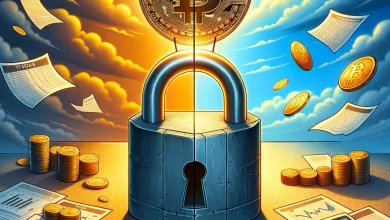Joerg Platzer: No Revolution Ever Fought for Freedom of Transaction Because It Always Was There
The financial world is getting ready for a cashless society of the future. Not the one lacking physical banknotes and coins, but the one lacking cash as the element of individuals’ financial freedom, no matter how limited it may be.
In an interview with ForkLog, crypto-economist and founder of Room77 Joerg Platzer explains why the governments and banks love the idea of a cashless society and what the role of Bitcoin in such a society would be. Here’s an adapted transcript of the interview.
Lily Tulupenko: Some people believe that transparency of the financial operations of individuals is a key element of democracy. Others say it’s a violation of privacy, which is an essential component of a liberal society. What is your opinion on this matter?
Joerg Platzer: I believe the activities of governments should be entirely transparent. I believe the activities of individuals should be as private as possible. The German hacker scene actually has as a motto: “Private Daten schützen, Öffentliche Daten nützen,” which means “protect private data and use public data.” In Bitcoin, we have a similar concept that is called user-defined privacy. As you know the Bitcoin blockchain is an entirely transparent public ledger. It’s also pseudonymous, so you can only see the addresses behind a transaction but don’t necessarily know who’s behind these addresses. It is great but there’s room for improvement.
We actually need more privacy and anonymity for individuals in Bitcoin. But there are organizations for which it might be really important to be transparent. Imagine a non-profit funded by donations. People will want to know how much money did it get and how much it spends. Here blockchain actually offers the perfect tools to offer transparency to the people. User-defined privacy is the keyword here.
Lily Tulupenko: Is it possible for the blockchain to become the foundation of a surveillance state?
Joerg Platzer: For blockchain itself, yes, it is, especially if you can discover the real-life identities behind all the addresses. We do have examples of blockchain applications that offer a very high degree of privacy and anonymity. Monero is an example there.
I just can only repeat: Bitcoin has a bright future if we manage to increase the degree of privacy and anonymity and thus the fungibility of Bitcoin. Privacy and anonymity in a monetary system have also got to do with the quality of the money. If the government would be capable of knowing the identity behind every Bitcoin address, they could blacklist them. The government could make it illegal to receive money from certain addresses. Or whitelist addresses and demand that people transact only with those.
This is not only a problem for privacy and anonymity, but this is also a problem for the money itself. It takes the fungibility away from the money. Fungibility means that every unit of a currency has to be treated exactly the same: every ounce of gold is an ounce of gold. It doesn’t matter who had it before or if it was involved in some illegal business. If you take that property away, some of the units of the currency are suddenly worth less than others. You cannot spend the “dirty” currency everywhere.
Lily Tulupenko: You’ve said that the freedom of transaction should be a basic human right. Can you elaborate on that?
Joerg Platzer: I strongly believe that freedom of transaction is a basic human right that people have forgotten to declare. It was never declared because we’ve had the freedom of transaction for the past thousands of years. We had anonymous cash money, so we could make whenever and wherever, exchanging whatever goods or services we’d wanted to.
In the Information Age, everything is digitized. Other basic human rights like freedom of speech, freedom of assembly, or freedom to travel anonymously now depend on digital processes, in which you can be identified. That’s a bad thing. If you’re a dissident in a dictatorship country and the government claims you have freedom of speech, but you cannot pay for your internet access online in an anonymous way, that freedom of speech doesn’t give you anything. You cannot exercise your freedom of speech if you cannot pay anonymously for a train ticket and anonymously travel to a meeting or an assembly.
Freedom of transaction is an underlying thing, upon which all the other declared human rights are built. For that reason, I think we should put that human right on the agenda. We cannot exercise other declared human rights without the freedom of transaction.
Lily Tulupenko: If we would totally remove cash and every single transaction was to be
intermediated by a third party like the government or a payment provider, what kind of consequences would it have for the society?
Joerg Platzer: If every economic interaction you have is being recorded you have the ultimate surveillance state. You will also be subject to fees each time you make a transaction. Governments love the idea of a cashless society because it gives them full surveillance potential. Banks love this idea because it allows them to take a little percentage off every chewing gum you buy.
There’s also another reason for the existing financial system to want to abolish cash. Currently, in order to keep the system running, we have to move further and further into negative interest rates. We have -0.4% in the EU now and it may be -0.8% next year. Eventually, people will just go to the bank, withdraw their money and put it under their mattress. The system needs to take in people’s wealth to survive.
Lily Tulupenko: Interestingly, Germany seems to be sort of the opposite of a cashless society. Just a few years ago you couldn’t buy anything without cash. How did it all happen?
Joerg Platzer: That’s got to with the unique monetary history of Germany. Germany is a prime example of hyperinflation. It took place a hundred years ago, but there’s somewhat of a collective memory of it. We had five or six devaluing currency changes in the last 100 years. I think the German population got burned too many times by their money being manipulated, inflated, or taken away. I think that Germans trust banks even less than they trust other people.
Lily Tulupenko: Do you think that Bitcoin can preserve financial freedom in a cashless society?
Joerg Platzer: Bitcoin is literally our escape from the cashless society. First of all, cash is not defined by being paper notes and coins. Cash is defined by certain properties: you should be able to transfer it without a middleman, the receiver must be able to validate the transaction right away, the transaction must not be reversible, and the identities of the sender and receiver should not be necessary for it to happen.
With Bitcoin, we’ve managed to transfer these properties into a digital model. Bitcoin deserves the term “digital cash” and it will replace the cash we use today if it’s taken away by the government.
Lily Tulupenko: Protesters in places like Hong Kong have made their revolution without really relying on Bitcoin. Why is that?
Joerg Platzer: It’s because they still have cash as an anonymous means of payment. No revolution ever fought for the freedom of transaction because it always was there. We’ve always had this physical cash.
The American Revolution would not have happened if Franklin and all the other revolutionaries would not have been able to anonymously travel to meet up. If they would have had to pay their travel expenses with a credit card or PayPal, the English King would know what they’re up to and there would be no revolution.
In Hong Kong, they still have cash so they can use it to pay for subway tickets anonymously. Although, the Hong Kong government can simply force people to pay their tube fares with a credit card.
Follow us on Twitter and Facebook and join our Telegram channel to know what’s up with crypto and why it’s important.
Source: forklog.media
View original post





